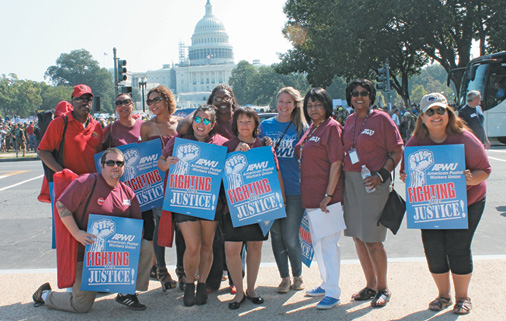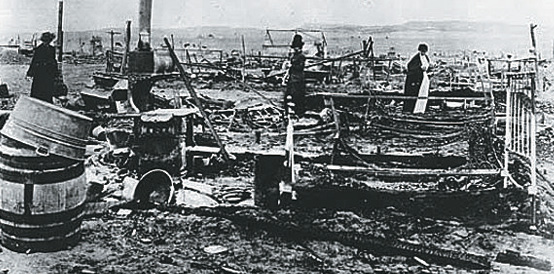Organize for a Safe, Non-Hostile Work Environment
November 1, 2016
(This article first appeared in the November-December issue of The American Postal Worker magazine.)
We are now entering our busiest season, and union members want a safe and non-hostile work environment. It’s also in the Postal Service’s best interest to protect their dedicated workforce and make the holiday season successful, not stressful.
The USPS can help create a safe, non-hostile work environment by providing full staffing – and that includes on the DBCS machines, with at least two mail processing clerks. We also need full coverage throughout our plants, at the windows, stations and Associate Offices. In addition, we need more Maintenance Craft and MVS Craft staffing.
Over the last four years, most offices and plants have been understaffed. Since early retirement was offered in 2013 and partial plant consolidations took place, staffing has not recovered.
The union has been working hard to force management to hire more employees and convert Postal Support Employees (PSEs) to career to fill in the gaps, but the union also needs our members’ help. If you are working short-staffed, contact your union representative to file a grievance and document how your office or section is understaffed.
If you don’t normally have coverage when someone is on sick leave or annual leave, you are short staffed. If your office is working overtime continuously, there is a staffing problem. If someone retires and management does not repost the job, you have a staffing problem.
Hostile Management
But there’s more: The USPS needs to train managers how to treat employees in a positive, non-hostile way.
If you are working in a hostile environment because of an abusive supervisor, all union members need to stand together and report the abuse to your union representative so that the problem can be documented. Nothing will change if you accept your working conditions without a fight. Documented facts and witness statements will help the union get action to change the hostile workplace.
Gallup, which conducted the Postal Pulse survey for the USPS in 2015, reported to Postmaster General Megan Brennan that the results show a hostile work environment. Many managers have retired and training new managers has been slow, but a bigger problem is that, more often than not, management just moves offensive supervisors from one office to another and never really corrects the problem.
The abuse just follows to other facilities. At the national level, we have created a Regional/Area-level management and union investigatory team to investigate serious hostile work environments. We need to receive evidence of the hostile work environment from locals to begin investigations. That is why it is so important that members provide evidence when a hostile work environment exists. A hostile work environment is when your supervisor’s actions are offensive or discriminatory, including when they intentionally inflict emotional and or physical distress on you or others.
Becoming More Powerful

There are ways to become more powerful on the workroom floor, and that is to organize among union members. You can volunteer to be one of the members that shares union information and works with your local union representatives to make your work environment better. This is the time to get involved. Many people died for our right to organize and join unions so that today we can fight for justice.
An example of standing together was the United Mine Workers of America rally in Washington, DC, on Sept. 8. Over 7,000 UMWA members and other union members came by bus from all over the country. They stood together to stop the attack on miners’ health and pension benefits that were promised to retirees, spouses and dependents.
Coal miners were promised lifetime retirement and health care benefits by the U.S. government in 1946. That promise has been kept until now. Retired miners are on the edge of losing everything they have worked for and benefits they contributed to.
APWU members stood in support at the rally, and remembered how miners fought for their rights in years gone by. In 1913, miners stood together in Ludlow, CO, on land leased by the union to set up tents for the families that went on strike. Families had been kicked out of their company houses because they were fighting for safety on the job. The company fired rounds of bullets into the tent city and set fire to the tents, burning to death workers, women and children.

Massacres happened in our history, where workers had formed unions and fought injustice. This history can be found in film documentaries. Those that were killed died fighting for each other, for their children and for future generations.
We are those future generations. And we can organize and work together to make our workplace better, without the fear of being shot down. We can stand strong at a rally without the fear of being slaughtered.
So I say, why not get involved with your local now so we can make our work environment safe and non-hostile. Start attending union meetings, educational workshops and union trainings. Learn about your new contract and how to help enforce it on the work floor.
We need to be ready not only for the battle against privatization and consolidations, we need to be ready to defend our rights and benefits. A large percentage of our workforce is eligible for retirement. When our senior members retire, there must be union activists to continue to protect our rights. Having a national contract will not help you on the workroom floor unless there are people willing to stand up and enforce those rights.
If you are already active, help mentor more activists. If you are not active yet, start now by volunteering to help your local union. Have a blessed holiday season and thanks for your support in our national elections both for our country and our national union.



